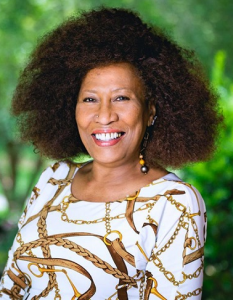 Please join us in welcoming Gladys Krigger Washington to the RMHF team as Senior Fellow. Gladys is the retired Deputy Director of the Mary Reynolds Babcock Foundation, where she supervised the Foundation’s programmatic work in 11 Southern states. She has done award-winning work in the philanthropic and service sectors and has been a champion and leader in deepening philanthropy’s commitment to racial equity, civic engagement and capacity building. Starting this summer, Gladys will work with the RMHF program team to refine our programmatic strategy and help us become more effective grantmakers, particularly as it relates to general operating support grants.
Please join us in welcoming Gladys Krigger Washington to the RMHF team as Senior Fellow. Gladys is the retired Deputy Director of the Mary Reynolds Babcock Foundation, where she supervised the Foundation’s programmatic work in 11 Southern states. She has done award-winning work in the philanthropic and service sectors and has been a champion and leader in deepening philanthropy’s commitment to racial equity, civic engagement and capacity building. Starting this summer, Gladys will work with the RMHF program team to refine our programmatic strategy and help us become more effective grantmakers, particularly as it relates to general operating support grants.
Gladys is known for being forward-thinking, creative and strategic in her work. She has occupied several notable leadership positions and is the recipient of prestigious awards in the service and philanthropy spaces. In 2019, Gladys received the Berea College Service Award, which honors those who exemplify a commitment to interracial education, learning and service. In 2015, she was named the James A. Joseph Lecturer by the Association of Black Foundation Executives, the organization’s highest honor. Gladys is the former Chairwoman of ABFE’s Board of Directors, and has been featured in many publications, including Grantmakers for Effective Organizations, Black Gives Back, the Center for Effective Philanthropy and the National Committee for Responsive Philanthropy.
Gladys has a wealth of expertise in capacity building work with grassroots organizations, and she was a pioneer for the general operating support funding model as the leader of the Mary Reynolds Babcock Foundation. In a 2020 RMHF interview, Gladys said of her work, “At Babcock, we figured out that there was a whole lot of merit in working with the folks who were closest to the problems in their communities, and actively working to address them. We believed that capacity building with those organizations could strengthen their internal operations and make them more effective over time in regard to the issues that were most important to them and their communities. That’s why we chose to invest in capacity building, or organizational development, as a way of supporting grassroots organizations and grassroots leaders.”
Our work with Gladys began in 2016 when she served as a consultant for our Trustees, as they focused on developing an equity-centered strategic framework. Gladys worked with us again in 2020 to help our team improve as program officers. That same year, in response to the recommendations of both our classes of Equity + Health Fellows, Gladys worked with our team to better understand capacity building and how to advance racial equity. She continues to coach our team as we learn about incorporating general operating support grants into our funding strategy, and RMHF is very much looking forward to benefiting from her expertise and leadership as we explore and innovate our own giving strategies.
The Center for Effective Philanthropy defines general operating support grants as those that provide “nonprofits with the flexibility to use funds to fulfill their missions and the ability to plan for the long-term sustainability of their organizations, programs, and services.” Gladys shares that, “General operating support grants allow nonprofits to devise their own solutions based on their experience in their communities and in the field.” We began making general operating support grants to our Safety Net partners in 2017. We have been on a path to move more and more to general operating support grants.
Over the summer, Gladys will continue working with the team to consider what would be required to further transition to a strategy of general operating support grantmaking. Though this strategy requires more due diligence on the part of the grantmaker when it comes to selecting grantee organizations, general operating support grants represent a shift of power related to the use of those funds. Nonprofits in the community benefit immensely from the flexibility of this model, which often fills in the gaps left by other program-specific funders, and helps benefiting organizations stay on-mission. Gladys explains: “An over-reliance on program support can create a situation in which organizations design programs not to achieve the best results they can for the organization and the people that they serve in their communities, but based on what they believe the foundation wants them to do. Designing for the achievement of funding, rather than results, hurts nonprofits and it hurts grantmakers, because the impact and outcomes you’re looking for will not be realized.”
As RMHF deepens our learning around general operating support funding, the focus will always be on health and racial equity. The difference is that funds would be entrusted to the leaders and organizations in our community who share our goals, values and focus areas, enabling them to take action in the ways they know will be most effective. Gladys believes, “General operating support can strengthen the relationship between a grantee and grantmaker, leading to more influence for the grantmaker, and a more productive partnership.”
We believe that strengthening grassroots organizations is critical if we are to advance our mission of fostering an equitable and healthy Richmond region. We are looking forward to the ways Gladys, and her expertise, leadership, insight and enthusiasm, will move us toward the realization of that mission.
We look forward to sharing the Board-approved strategic plan and programmatic strategy in early fall.